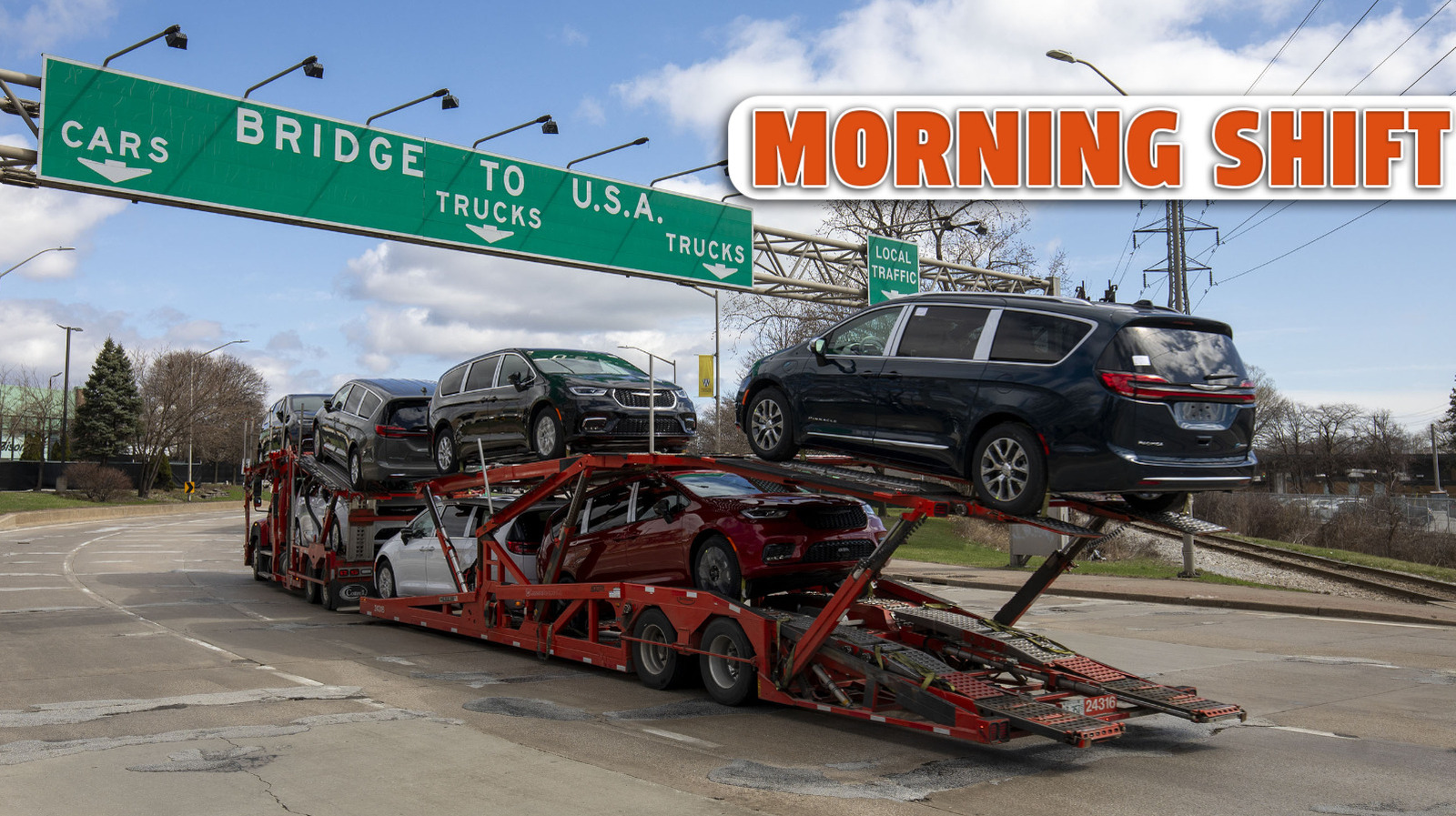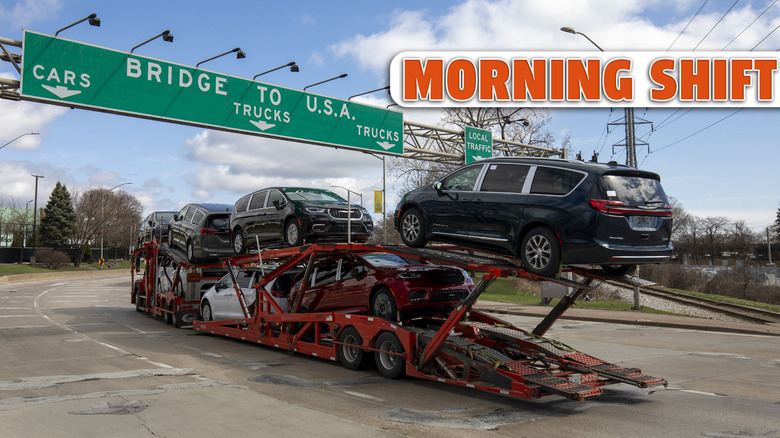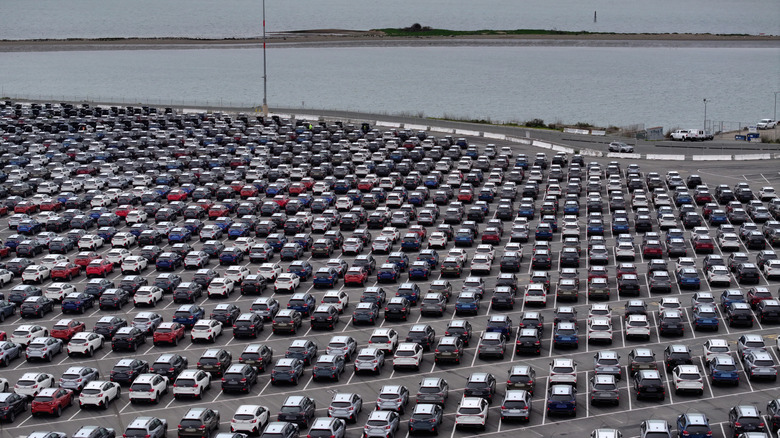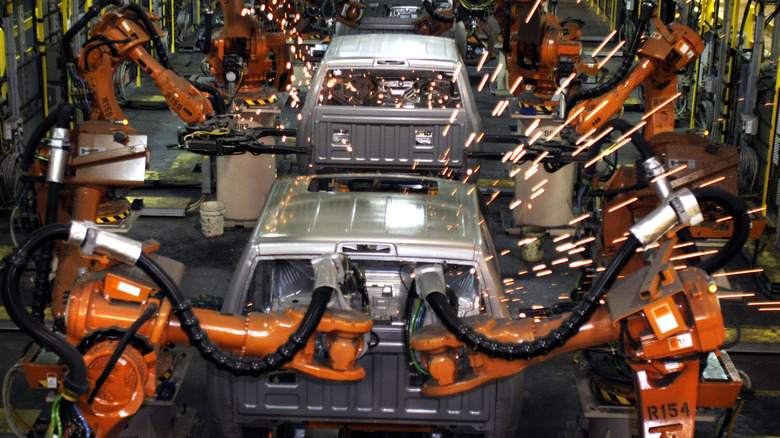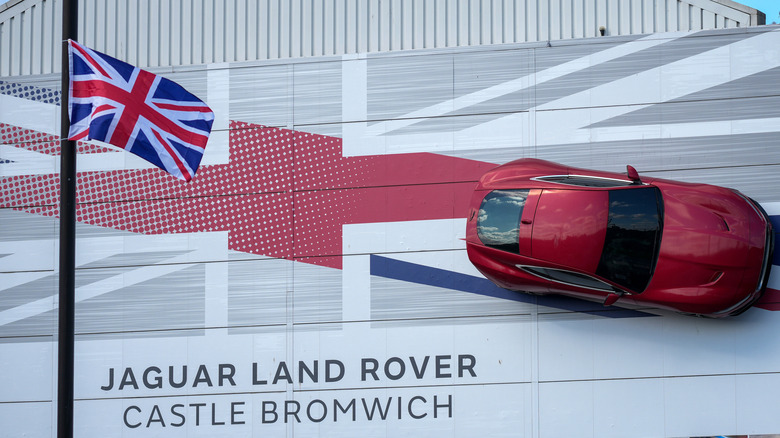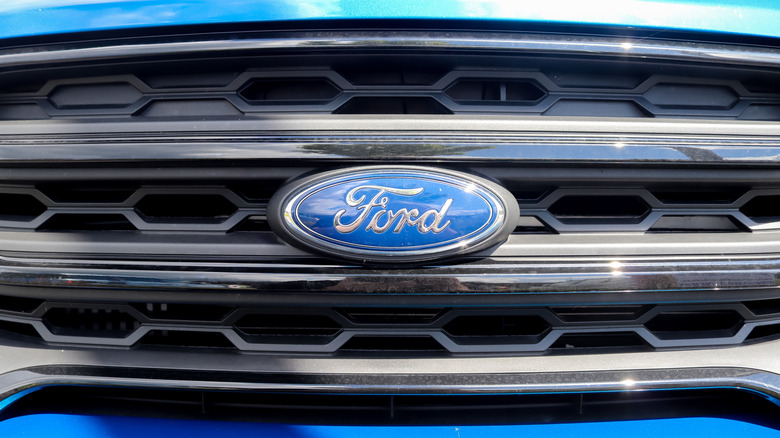Good morning! It’s Friday, October 17, 2025, and this is The Morning Shift, your daily roundup of the top automotive headlines from around the world, in one place. This is where you’ll find the most important stories that are shaping the way Americans drive and get around.
In this morning’s edition, North American car import tariff costs cross $10 billion for automakers, Stellantis is now dealing with the same aluminum shortage Ford is, production is fully up and running once again at Jaguar-Land Rover, and Ford is ending the week with a couple of recalls that cover nearly 625,000 vehicles.
1st Gear: Bill on auto imports from Canada and Mexico crosses $10 billion
Sure, the U.S. government is striking deals with other countries to bring down tariff costs put in place by President Donald Trump, but automakers are still paying through the nose — even when it comes to North America. So far this year, automakers have forked over $10.6 billion in tariffs that have been imported to the U.S. from Canada and Mexico, according to analysis by the Anderson Economic Group. It should be noted that the analysis includes U.S. Census Bureau data through July, and then estimates the costs of tariffs from August through October.
Thus far, these companies have elected to take on the brunt of these costs, rather than passing them on to new-car buyers, but it’s very likely this trend will not continue as tariff costs pile up and profits erode. Hell, we just told you that the average new car price crossed $50,000 for the first time. If that isn’t a bleak sign of things to come, I don’t know what is.
Even more worrying is the idea that the tariff bill these OEMs are facing is likely even higher than the group’s estimates. From Automotive News:
The figure includes only vehicles and parts imported from Canada and Mexico and does not include products shipped from other nations. It also does not include 50 percent tariffs on steel, aluminum and a list of derivative products made up of those metals, including some auto parts and manufacturing equipment.
The U.S. collected $6.45 billion in duties on Canadian and Mexican vehicles and parts from January through July, according to the latest U.S. Census data. AEG projects companies to have paid about $1.4 billion per month in tariffs on those products from August through October.
The U.S. began collecting the vast majority of annual tariff revenue from Canadian and Mexican auto imports in April, when the Trump administration implemented a 25 percent duty on vehicles and a wide range of parts.
There are exceptions for vehicles and parts that comply with the United States-Mexico-Canada Agreement’s rules for preferential treatment. USMCA-compliant vehicles are subject to a 25 percent duty only on the value of their non-U.S. content, while USMCA-compliant parts can enter the U.S. duty-free.
Imports from other countries vary. In the EU and Japan, cars are subject to a 15% duty. South Korea has reached a similar deal with the U.S., but it has yet to be implemented. The deal with the UK means that the first 100,000 vehicles imported are subject to a 10% tariff. All other countries remain at 25%.
Things are about to get very worrisome and very expensive, my friends.
2nd Gear: Stellantis is dealing with the same aluminum shortage as Ford
Ford isn’t the only automaker being deeply impacted by an aluminum shortage caused by a fire at a New York supplier. Now, Stellantis and its suppliers are facing production disruptions. Warren Truck, where the automaker builds the Grand Wagonner full-size SUV, is being idled for three weeks due to a parts shortage stemming from the September 16 Novelis aluminum factory fire. United Auto Workers union officials confirmed the news. From Automotive News:
“Due to a parts shortage, Warren Truck Assembly Plant will be idled beginning the week of Oct. 13 for three weeks,” spokeswoman Ann Marie Fortunate said in an email to Crain’s Detroit Business, an affiliate of Automotive News. “The plant is expected to resume production the week of Nov. 3.”
[…]
At Stellantis, the automaker is prioritizing its profit-rich Ram 1500, built at Sterling Heights Assembly Plant, according to Stellantis supplier officials. The pickup has significant aluminum content, though it is not as exposed as the F-150.
[…]
[P]roduction of the top-selling Ford F-150, which sports an aluminum body, has been cut by more than half at Dearborn Truck Assembly as the automaker grapples with a shortage of the metal stemming from the Novelis fire.
Ford indicated to suppliers that it plans to build around 530 pickup trucks per day in Dearborn until Oct. 27, down 55% from typical levels, according to an analysis of supplier releases, which Ford issues to dictate the flow of just-in-time parts to its assembly plants.
Novelis, which counts Ford as its top customer, is not expected to reopen its hot mill plant until the first quarter of next year at the earliest. Staring down what analysts say could be a $1 billion profit hit, Ford is scrambling to source aluminum elsewhere to feed its pickup profit machine.
A third automaker — Toyota — is also being impacted by the shortage. However, the impact isn’t totally clear at the moment. A spokesperson for the Japanese automaker said working through the disruption is no different than tariffs or any other sort of unexpected headwind.
3rd Gear: JLR production is fully up-and-running
I’ve got some huge news for all my Jaguar-Land Rover Stans out here: all production lines are officially up and running more than six weeks after a massive cyberattack knocked out global operations. On October 16, production lines at its Halewood plant, which builds the Range Rover Evoque and Discovery Sport, restarted for the first time since the September 1 attack. A $670 million renovation plan to produce JLR’s upcoming EVs at the plant has also restarted.
The news comes following restarts of Defender and Discovery lines in Nitra, Slovakia, as well as Range Rover and Range Rover Sport lines at Solihull. Both started up last week. Initial production output is expected to be limited, as JLR has referred to the process as a “controlled, phased restart.” From Autocar:
Operations at the Wolverhampton engine plant, Birmingham battery centre and Solihull body and paint shop are now all back up and running, as are stamping operations in Castle Bromwich, Halewood and Solihull.
A statement regarding the restart at Halewood read: “This is another important moment for JLR, for our suppliers and our people.
“We’re all super-proud of the resilience of our people and their energy to get back to doing what they do best – building world-class British luxury vehicles for our global clients.”
The cyber attack on 1 September brought all factories to a halt and incapacitated JLR, forcing it to shut down its internal computer systems in an effort to protect data from being stolen.
This resulted in production shutdowns at all of its global plants, created issues with parts ordering and stifled retailers.
[…]
“It has been a challenging quarter for JLR,” outgoing CEO Adrian Mardell said in a statement. However, he said that sales in July and August had been “in line with our expectations” before the cyber attack.
The cyberattack cost JLR an estimated $2 billion in revenue as well as an estimated $67 million per week, but the UK government guaranteed a $2 billion loan to help shore up suppliers who were hit by the shutdown.
During the last quarter that ended on September 30, JLR’s sales dropped by 21,138 vehicles to 66,165. That’s, uh, not great. Time will tell how the beleaguered automaker bounces back.
4th Gear: Ford ends the week strong, recalls 625,000 vehicles
It’s been a little bit since we’ve talked about a Ford recall, so I figured that there would be no better way to kick off the weekend than by covering two of them! The Blue Oval is recalling just about 625,000 vehicles in the U.S. in two separate recalls: one is for a seatbelt issue, and one is for a rear-view camera display problem, according to the National Highway Traffic Safety Administration. From Reuters:
The seatbelt recall affects 332,778 Ford Mustang vehicles, while the camera display issue recall covers 291,901 F-250, F-350 and F-450 super duty trucks, according to NHTSA notices.
The U.S. auto regulator said that Ford dealers will update the image processing module software at no cost to owners for the units being recalled to remedy the camera display defect.
For the units facing issues with seatbelts, vehicle dealers will check the seatbelt parts and make replacements if needed, and also remove nearby carpet sections that touch the cables, NHTSA said.
According to NHTSA’s website, these are the 119th and 120th recalls Ford has issued this year. No other automaker has more than 39. Ford is truly going further.
Reverse: Did you feel that?
There’s an excellent ESPN documentary about this called “The Day the Series Stopped,” and I cannot recommend it enough. However, if you don’t have 50 minutes to spare today, you can always just check out History.com.
On the radio: Ace Frehley – New York Groove
RIP Ace Frehley. I think you would have really enjoyed Zohran Mamdani’s New York City mayoral debate performance last night. It’s just about the proudest I’ve been to be a New Yorker in quite a while.


